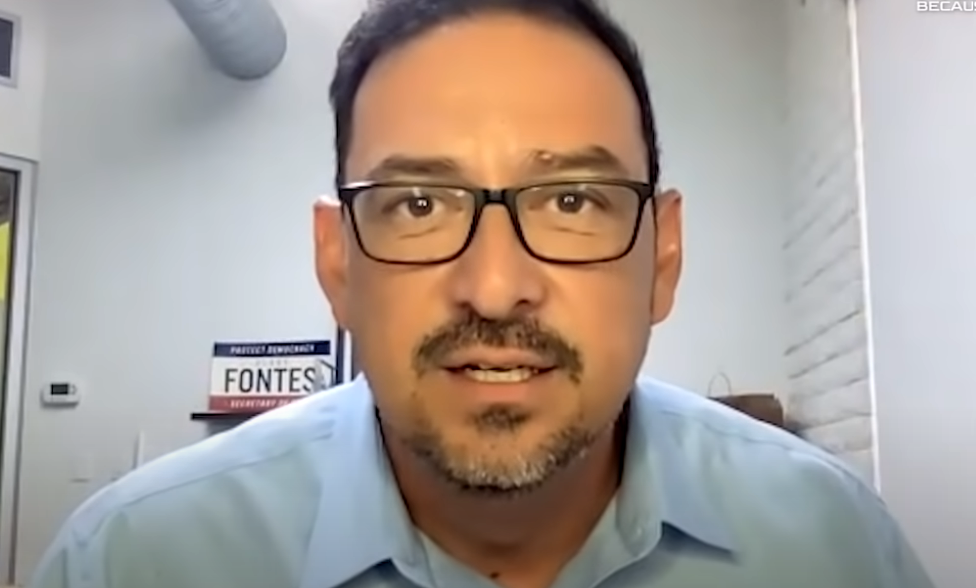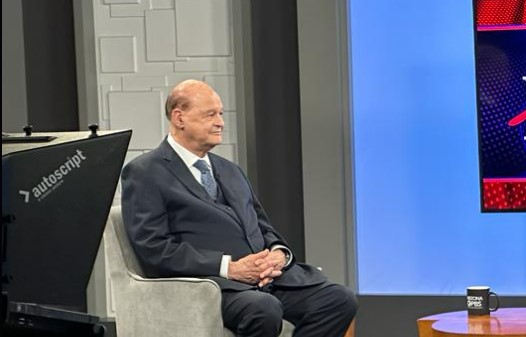
by Daniel Stefanski | Jan 4, 2024 | News
By Daniel Stefanski |
One Arizona Republican Senator continues to hold the Biden administration accountable over the recent closure of a port of entry at the border.
On Wednesday, State Senator T.J. Shope, reacted to news of the Lukeville Port of Entry reopening, calling the initial move to close the vital border crossing “irresponsible and reckless.”
In his statement, Shope said, “Not only did this create financial turmoil for border communities within Arizona who rely on the tourism traffic to and from Rocky Point to support their families, but the closure of the Lukeville Port of Entry also put unnecessary stress and strain on our citizens and commerce who depend on a safe and direct route to this popular destination.”
Over the past few months, the border crisis has deteriorated considerably, forcing the Biden administration to take rather unprecedented measures in a frenzied attempt to mitigate public perception of the massive influx of illegal immigrants into the country. One of those actions was the closure of the Lukeville Port of Entry, which is the main thoroughfare to the popular tourist destination of Rocky Point, forcing families or commerce operators to detour hours to the east or west. A local business owner recently told an Arizona outlet that, in the aftermath of the closure, Rocky Point “was like a little ghost town,” noting that “local business, restaurants, hotels, rentals, everything has declined.”
Shope continued to address the situation in southern Arizona in his lengthy statement, blasting the Biden administration for a severe lack of border security. He said, “While I’m glad Lukeville is reopening on Thursday, the official statement from the federal government includes an absurd claim that ‘CBP will continue to prioritize our border security mission as necessary in response to this evolving situation,’ which is a blatant lie. The American people aren’t dumb. Nothing has changed at the border to prompt the opening of Lukeville. Thousands of illegals, many of which are criminals and terrorists, continue to pour into our state on a daily basis, overwhelming our brave law enforcement personnel. This was purely a political move after Republican lawmakers put immense pressure on the Biden administration to open this critical artery for commerce and legal traffic.”
The lawmaker promised to persist in holding the president accountable to his responsibility to secure the border and to refrain from closing American ports of entry.
Though the border crisis appears to be worsening by the day, legislative Republicans have effectively made the point that the reality for Arizonans could be more daunting if not for their check on the Democrats in the state – especially Governor Katie Hobbs. When Hobbs signed the state budget compromise in May, Senate President Petersen highlighted that his members “prevented the Governor and Democrat Legislators from advancing their extremist agenda…we’re not getting rid of state funded border security resources to keep our communities safe.” In the upcoming session, starting next week, expect Republicans to continue to introduce bills and policies that would give the Grand Canyon State more ability and resources to combat the many scourges of the border crisis.
Daniel Stefanski is a reporter for AZ Free News. You can send him news tips using this link.

by Daniel Stefanski | Jan 3, 2024 | Education, News
By Daniel Stefanski |
Mere days before the start of the 2024 Arizona legislative session, the state’s Democrat governor is finally telegraphing her primary plan for the months ahead – though her proposal is likely dead on arrival with the Republican-led House and Senate chambers.
On Tuesday, Governor Katie Hobbs issued a press release to reveal “her plan to increase accountability and transparency in the ESA voucher program.” The governor’s plan has eight elements, including “increasing student safety, protecting rights for students with disabilities, requiring accountability for taxpayer dollars, expanding auditor general authority, prohibiting price gouging, raising educational standards, establishing program transparency, reinstating eligibility requirements.”
In a statement, Governor Hobbs said, “The ESA program lacks accountability and transparency. With this plan, we can keep students safe, protect taxpayer dollars, and give parents and students the information they need to make an informed choice about their education. Arizonans deserve to know their money is being spent on educating students, not on handouts to unaccountable schools and unvetted vendors for luxury spending. My plan is simple: every school receiving taxpayer dollars must have basic standards to show they’re keeping our students safe and giving Arizona children the education they deserve.”
Hobbs’ announcement was followed by two volleys from leading Arizona Republicans. House Speaker Ben Toma immediately highlighted his opposition to the governor’s announcement, saying, “Empowerment Scholarship Accounts are wildly popular with Arizona parents because they leverage private sector solutions to offer the best educational opportunities for their children. Meanwhile, Governor Hobbs and Democratic Party legislators now seek to strangle ESAs and private education with bureaucracy and regulation. I won’t allow that to happen.”
The state’s schools chief, Superintendent Tom Horne, also issued his own statement, focusing on the governor’s proposition to mandate “accountability” for user purchases in the ESA program. Horne said, “One proposal stands out because it’s already in place: The governor recommends a manual review of ESA purchases over $500. My office already reviews all expense requests regardless of amount, unlike the previous superintendent who approved many frivolous requests. In 2023, we rejected several thousand ESA applications for lack of adequate documentation and suspended almost 2,200 accounts totaling $21 million because the student was enrolled in a public school. We’ve also rejected more than 12,000 ESA purchase order requests.”
Other legislative Republicans shared their sentiments against Hobbs’ proposals. Senator Jake Hoffman posted the following to his “X” account: “Let’s be very clear… Katie’s half cocked attempt to destroy an invaluable parental choice option via ‘death by a thousand cuts’ is DOA at the Capitol. The Arizona Freedom Caucus will make sure of it.”
Representative Jacqueline Parker added, “Nothing lacks more accountability & transparency than the government school system. ESA’s are an extremely successful & equalizing solution, so of course democrats want to mess it up.”
Arizona’s universal ESA program has long been a significant point of contention between members of the two major political parties in the state, though legislative Republicans scored a huge victory in 2023 when they negotiated a budget compromise with Hobbs that left the historic school choice opportunities completely unscathed. After news of the budget agreement hit the wires, many Democrats and education interest groups levied their disappointment and disapproval over the governor’s inability to extract any concessions with the program. Hobbs spent the rest of the year picking fights with Horne over the stewardship and leadership of ESAs in an attempt to win back political capital, leading to this announcement just ahead of the commencement of the upcoming session.
Daniel Stefanski is a reporter for AZ Free News. You can send him news tips using this link.

by Daniel Stefanski | Jan 3, 2024 | News
By Daniel Stefanski |
Arizona has a new Elections Procedures Manual for the 2024 cycle, though litigation is all but certain from state Republicans.
On Saturday, just before the statute-mandated deadline of December 31, Democrat Adrian Fontes issued the 2023 Election Procedures Manual, after securing approvals from his fellow Democrat officeholders, Governor Katie Hobbs and Attorney General Kris Mayes. In a statement to accompany the release of the manual, Fontes said, “Free, fair and secure elections have been this group’s commitment to the voter from the very beginning. This is what happens when a committed group of leaders comes together to serve their community. It’s good for our democracy and it’s good for Arizona.”
For the first time since 1978-1979, Democrats control the top three statewide offices in Arizona (Governor: Bruce Babbitt, Attorney General: John LaSota, Secretary of State: Rose Mofford). One of the most significant consequences of securing this power trifecta is the ability to negotiate, craft, and green light the state’s Election Procedures Manual without initial interference from opposing political voices, as required by law every two years.
Arizona Republicans were quick to push back against the elections manual and signaled a willingness to challenge the legality of its contents in court. House Speaker Ben Toma stated, “A lawful Elections Procedures Manual is paramount for the integrity of our elections. It’s been a top priority of the Arizona House Republican Caucus. I’m disappointed that SoS Fontes refused to correct many objections we raised in our comment to the EPM draft. We are preparing for litigation.”
The speaker’s reference to previous ‘objections’ harkened to an August public comment letter, which was submitted by Senate President Warren Petersen and Toma to the Arizona Secretary of State’s Office after they reviewed the draft manual. Then, the legislators had identified their chief concern with Fontes’ initial offering, which was the “unlawful delay in the implementation of a 2021 state law that helps prevent voter fraud by requiring county recorders to remove any voters registered on the active early voter list who have not cast a ballot during two consecutive election cycles and have not responded to notification from the recorder that they wish to continue participation.” Petersen and Toma asserted that the consequence of this delay would be the perpetuated issuance “of ballots being sent to the homes of voters who may have moved or no longer wish to participate in this process, opening the door for ballots getting into the hands of unintended individuals.”
In a new statement after the release of the approved EPM, Petersen said, “We warned the SOS early on that we would sue if the Elections Procedure Manual was not corrected to reflect the laws passed by the legislature. Unfortunately that did not happen. I imagine there will be many plaintiffs joining the Senate in protecting our elections.”
Arizona Republican Party Chairman, Jeff DeWit, also promised legal action against the manual, calling it an “egregious destruction of election fairness by the Democrats.”
The AZGOP shared four “concerning elements” from its cursory review of the manual: limitation of free speech, restriction of voter challenges, exclusion of Republican oversight, and refusal to heed legal precedent. In its press release, the state Republican party charged Fontes with “trying to take powers from the state legislature that are not his to take.”
Representative Alexander Kolodin weighed in on the EPM, writing, “Fontes’ EPM is not an Elections Procedures Manual, it is a how-to manual to disenfranchise Republican voters and a breathtakingly unlawful power grab. It cannot be allowed to stand!”
While most Arizona Republicans are united in opposition to the 2023 EPM, so, too, are Democrats in their support of the Secretary of State’s submission. Governor Katie Hobbs, who preceded Fontes, said, “Partisan politics should have no role in how we run our elections. This EPM builds on the 2019 EPM and 2021 draft EPM from my tenure as Secretary of State and will ensure dedicated public servants from across the state will have the guidelines they need to administer free and fair elections. Together, we can protect our democracy and make sure every Arizonan has the opportunity to have their voice heard.”
As Secretary of State, Hobbs was required to finalize the EPM in 2021, but a divided government shared with Republican Governor Doug Ducey and Attorney General Mark Brnovich stymied the quest to secure a green light for the manual. Hobbs and Brnovich were also mired in an ongoing political feud, which resulted in legal bar charges that the Secretary of State brought against the state’s top prosecutor and several of his attorneys. After receiving Hobbs’ updated manual, Brnovich sued the SOS “to compel her production of a lawful EPM.” Brnovich alleged that “the SOS failed to provide the Governor and Attorney General with a lawful manual by October 1, 2021, as required, and instead included nearly one-hundred pages of provisions not permitted under the EPM statute.” The challenge from the former Attorney General was rendered unsuccessful, and the state was forced to revert to the previous cycle’s EPM (2019) to govern the 2022 races.
Daniel Stefanski is a reporter for AZ Free News. You can send him news tips using this link.

by Daniel Stefanski | Jan 3, 2024 | Education, News
By Daniel Stefanski |
Arizona’s historic universal school choice program has seen significant growth in its first full year of operations.
Last month, the Executive Director for Arizona’s Empowerment Scholarship Account (ESA) program, John Ward, sent three emails to give a comprehensive update to families about the state of the program at year’s end. Ward first noted that the ESA program had grown from 13,400 students to 72,500 students over 15 months since the Arizona Legislature approved the expansion and then-Governor Doug Ducey signed the bill into law.
Director Ward also highlighted the economic efficiency of ESA, stating that “ESA parents educate their students for 27 percent less funding than students in traditional public schools.” According to the email from Ward, “State taxpayers currently spend approximately $9,800 per ESA student on average” compared to $13,400 from “federal, state, and local taxpayers to educate students attending traditional public schools on average.” Ward also pushed back on one of the main attacks against the program, sharing a projection from the Department of Education that the “State will end fiscal year with a $57M education budget surplus,” adding that “a surplus is not an indication of bankruptcy.”
In the second email to ESA families, Ward offered helpful tips to ensure that account holders would be compliant with their submissions. Those tips included “reviewing state law and the ESA Parent Handbook to become familiar with program requirements, submitting complete purchase documentation and curricula when required,” and refraining from purchases of unallowable items.
Ward’s final email gave a look at the future of the ESA program. The focus for the ESA program in 2024 would be further enhancements to the ClassWallet platform to improve user experience and to reduce times of approval for purchases and reimbursements. Fixes to the ClassWallet Marketplace are expected to occur first, followed by tweaks to DirectPay, reimbursements, and debit cards.
The new ESA Director inherited the program in a strong position thanks to the work of Superintendent Tom Horne’s first director, Christine Accurso, who did not have that luxury at the start of the year. Accurso, who has been one of the state’s leading pro-life and school choice leaders for years, joined the Horne administration after thwarting a ballot challenge to the universal ESA program. Horne and Accurso were tasked with bringing the expanded program under compliance with the law and eliminating the significant backlog of requests left by the previous administration. She resigned her position in July, expressing her grateful heart “to have had the opportunity to get the ESA program back on track and functioning well.”
As the Arizona Legislature returns to session in a matter of weeks, the ESA program will be under even more scrutiny as Democrat Governor Katie Hobbs and her legislative allies may attempt to gut or trim school choice in the state. Horne, though, has proven to be a relentless defender of the program, as have Republicans in the Legislature. This issue will undoubtedly be one of the top points of contention between the two sides – especially in an election year, when both Democrats and Republicans believe that they can use ESAs and school choice to their political advantage with undecided voters.
Daniel Stefanski is a reporter for AZ Free News. You can send him news tips using this link.

by Corinne Murdock | Jan 3, 2024 | News
By Corinne Murdock |
Arizona’s Android users should keep an eye out: they may receive a piece of a recent $700 million settlement over Google’s Play Store monopoly.
In addition to paying out millions to affected consumers, Google will initiate anticompetitive reforms concerning billing systems, app store monopolization, and third-party apps and stores.
Google agreed to reforms including the installation of third-party apps on phones outside of Google Play such as third-party app stores for at least seven years; allowing developers to offer alternative, cheaper in-app billing systems alongside Google Play’s billing system for at least five years; abstaining from requiring developers to price-match in-app purchases on Google Play versus alternative billing systems for at least five years; abstaining from requiring developers to launch their apps at the same time with the same or better features on Google Play as on other app stores for at least four years; abstaining from requiring the Play Store to be the pre-loaded app store on a device for at least five years; abstaining from requiring manufacturers to obtain its consent prior to preloading a third-party app store on a mobile device for at least five years; and maintaining functionality of a third-party app store for at least four years.
Those eligible for the restitution, totaling $630 million, are consumers who made purchases between August 2016 and September 2023. All 50 states, including Arizona, and the District of Columbia, Puerto Rico, and the U.S. Virgin Islands will receive $70 million for their claims.
Eligible consumers don’t have to submit a claim. They will receive automatic payments through PayPal, Venmo, or with permission a check.
Attorneys general from California, New York, North Carolina, Tennessee, and Utah led the lawsuit against Google: Utah v. Google. Utah initiated the lawsuit in 2021 with a coalition of 37 attorneys general, including former Attorney General Mark Brnovich, following several years of investigations into Google beginning in 2019.
The attorneys general accused the tech giant of monopolizing app store availability and, therefore, limiting choice and driving up app prices. The states accused Google of engaging in exclusionary conduct: shutting out competing app distribution channels and requiring consumers to pay inflated prices for in-app purchases, namely by requiring apps to run in-app payments through their payment processing services.
Investigatory efforts accused Google of originally launching and marketing Android OS as an “open source” platform. The model attracted original equipment manufacturers (OEMs) such as Samsung and mobile network operators (MNOs) such as Verizon.
After successfully attracting the desired OEMs and MNOs, Google closed the Android OS system and its app distribution market by requiring the OEMs and MNOs to enter restrictive, anticompetitive contracts.
Announcement of the $700 million settlement came just weeks before another, potentially greater settlement that Google entered into as part of a $5 billion lawsuit over the tech giant’s practice of tracking users’ internet activity while in “incognito” mode.
A formal agreement for court approval is expected by late February in that case.
Corinne Murdock is a reporter for AZ Free News. Follow her latest on Twitter, or email tips to corinne@azfreenews.com.

by Daniel Stefanski | Jan 2, 2024 | Education, News
By Daniel Stefanski |
The holiday season didn’t bring holly and jolly to the ongoing feud between Arizona’s Democrat Governor and Republican Superintendent of Public Instruction.
In the days leading up to Christmas, Governor Katie Hobbs and Superintendent Tom Horne exchanged press releases over their dueling perceptions of the due date of the quarterly Empowerment Scholarship Account (ESA) report.
On December 21, the Director of the Governor’s Office of Strategic Planning & Budgeting, Sarah Brown, transmitted a letter to Horne, asking him to send the FY 2024 Quarter 1 Report for the ESA Program to statutory recipients by the following day. Brown opined that this “late report comes after a number of stories showing a concerning lack of accountability and transparency in the ESA program.”
Governor Hobbs posted a short statement to her “X” account, asserting that “Arizonans deserve to know how their taxpayer dollars are being spent. We need true accountability and transparency in the ESA voucher program.”
Horne wasted no time in responding to the latest attack on the program he guides and stewards, saying, “The Department of Education has been in contact with the Governor’s Office for nearly three weeks regarding this issue. They are fully aware that we are preparing the report she has requested. Nothing is being withheld.”
Brown also accused Horne of essentially mismanaging dollars in his budget, highlighting the Department of Education’s spending of “millions of dollars advertising the program even with the escalating costs that threaten to crowd out critical spending from the State budget.”
The superintendent’s marketing efforts for the ESA program were practically mandated and empowered earlier this year with the passage of the State’s budget between Governor Katie Hobbs and Legislative Republicans, when freshman Senator Janae Shamp reportedly earmarked $10 million for school choice advertising at the Arizona Department of Education. On August 24, Shamp responded to a critical piece about the targeted funds, writing, “Families are not getting the REAL facts. So called ‘reporting’ by the left and their media henchmen fails to acknowledge the true winners of this money well spent…THE KIDS! Now they will receive education that meets their personal needs.”
Before Shamp’s allocation, Horne had executed marketing campaigns for the ESA program, though at far less expense than the levels he obtained after the latest State budget.
The Governor’s Office also pointed out the revelations of ESA dollars being used to fund “ski passes and luxury car driving lessons.” In his response to this criticism, Horne retorted that those “frivolous ESA spending approvals occurred under the administration of the Governor’s friend, Kathy Hoffman.” He added that his department had “reviewed more than 15,000 ESA applications, rejecting thousands that were incomplete in the first quarter of Fiscal Year 2024 alone.”
As he closed his statement, the Republican schools chief wished his readers a “Merry Christmas!”
Daniel Stefanski is a reporter for AZ Free News. You can send him news tips using this link.






